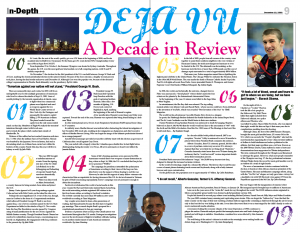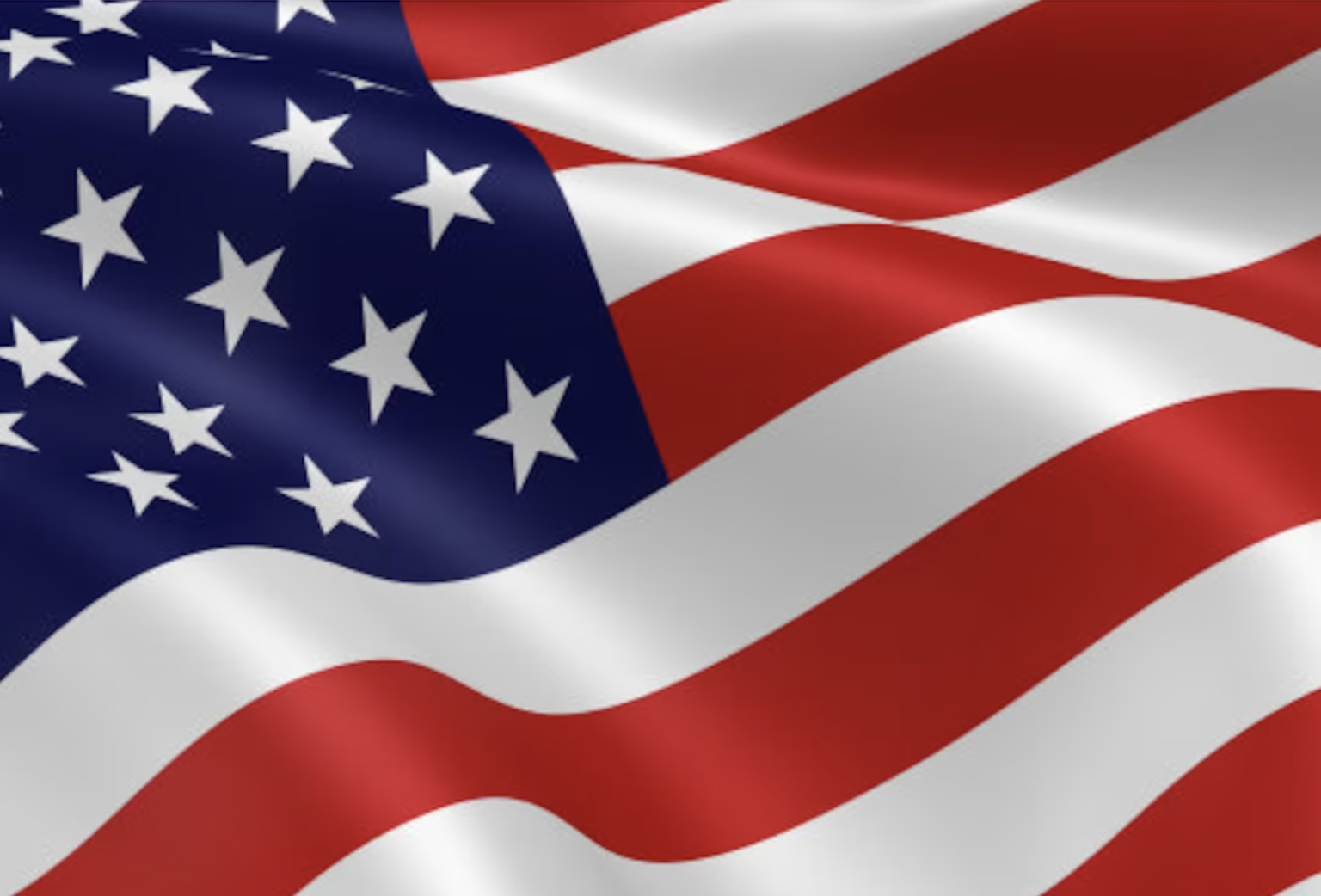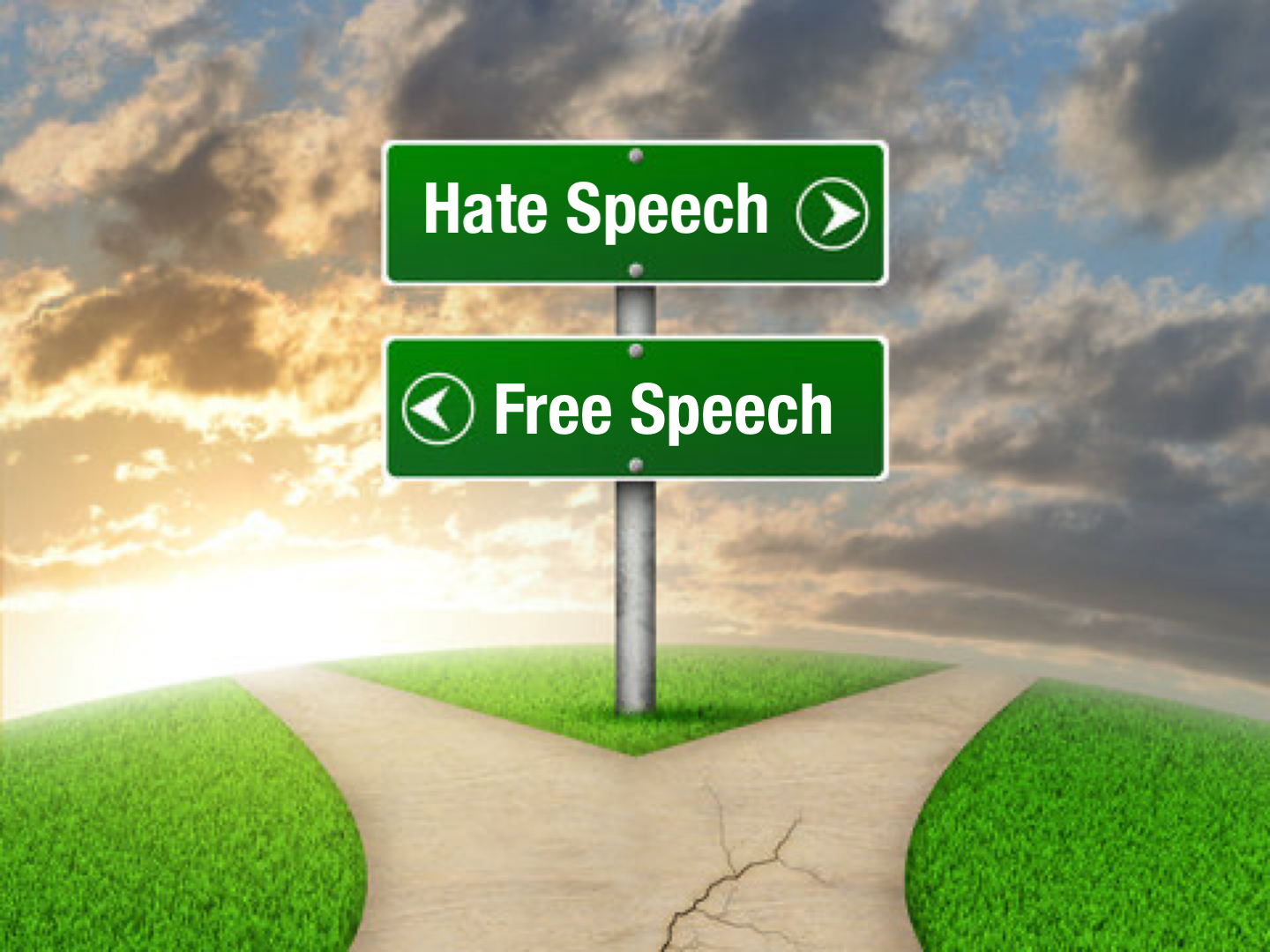A Decade in Review
–St. Louis, like the rest of the world, quickly got over Y2K fears at the beginning of 2000, and locals escalated into football fever. On January 30, the Rams gave St. Louis its first NFL Championship victory since 1951 in Super Bowl XXXIV.
From September 15 to October 1, the Summer Olympics were hosted in Sydney, Australia. Throughout the games, the U.S. won the most gold and total medals out of all competing nations, with 36 and 91 medals, respectively.
On November 7, the election for the 43rd president of the U.S. was held between George W. Bush and Al Gore, marking the closest presidential election in the nation’s history. Because of the close outcome, a lengthy recount process took place, leaving the final results unknown until December 13. Although Gore won the popular vote, because of the electoral college’s representation in Florida, Bush ultimately won the presidency. By Eric Aikin.
’01
There are memorable days and weeks, but 2001 will be an unforgettable year for the multiple generations of Americans who lived to witness the attacks of Sept. 11, 2001. Years of careful plotting by the terrorist organization al-Qaeda, came to light when four commercial planes were hijacked and used as weapons against the two World Trade Center towers of New York city, the Pentagon, and presumably the nation’s capitol killing 2, 976 American civilians. The plane headed toward the capitol was the only unsuccessful attack on that day. Members of Flight 93 realized the terrorists’ intentions through contact with loved ones
and overtook the plane which crashed just outside of Shanksville, Pa.
Violence of this caliber had not reached American soil since Dec. 7, 1941 when the military base at Pearl Harbor, Hawaii was bombed by the Japanese. Never in history, had such a devastating attack on civilians been carried out within the borders of this country. Surely this day, this year will live in infamy as well. By Julie Wells.
’02
The year 2002 brought a turbulent mixture of events. From the signing into law of the No Child Left Behind Act to the kidnapping and beheading of reporter Daniel Pearl, emotions dramatically
rose and fell.
Water was discovered on Mars; Switzerland,
a country famous for being neutral, chose sides and joined
the U.N.
Jimmy Carter ignored a 43-year-long embargo against Cuba and met with Fidel Castro on the island he rules over.
Perhaps the most significant U.S. event of the year, though, came in October in the form of a Congressional resolution which allowed President George W. Bush to use force against Iraq—one of seven countries named by the U.S. State Department as liable for the attacks of Sept. 11. Two weeks later, the Iraq War Resolution was also passed by Congress citing 10 main justifications for the use of force against the Middle Eastern country. Though President Barack Obama has resolved to redistribute American troops, concentrating more heavily on Afghanistan, the engagement with Iraq continues to the present day. By Julie Wells.
’03
President George W. Bush launched Operation Iraqi Freedom with the goal of capturing Saddam Hussein. After only a few months of fighting, U.S. Forces took control of Baghdad in April, marking the beginning of the end of Hussein’s regime.
A few months later, Hussein’s sons Qusay and Uday were captured. Toward the end of the year, Hussein was captured after being found hiding in a hole near Tikrit.
In other international news, Severe Acute Respiratory Syndrome (SARS) spread from China to 37 countries.
In celebrity news, Martha Stewart was indicted after obstructing the federal investigation of her December 2001 stock sale, resulting in her resignation as chairperson and chief executive officer of Martha Stewart Living. Who can forget the image of the ultimate perfectionist dressed in an orange jumpsuit?
Arnold Schwarzenneger provided yet another celebrity stunt with his election as governor of California after a recall against Gray Davis.
The year ended with a tragedy when the Columbia space shuttle flew its last flight before disintegrating during its reentry over Texas. All seven astronauts on board were killed. By Jeanetta Roberts.
’04
Some of life’s burning questions were answered in 2004. Americans worried there were weapons of mass destruction in Iraq, when on Sept. 16, 2004, the U.S. concluded that Iraq in fact never possessed “WMDs.”
The campaign for presidency intensified the polarization of Americans according to their views of the Iraq war. Sen. John Kerry won the support of those hoping to end the war. However, he also lost the support of many fellow veterans who characterized him as unpatriotic for having denounced the U.S. for its involvement in Vietnam. In spite of Bush’s increasing unpopularity, Kerry’s campaign was not persuasive enough to defeat the incumbent.
Facebook revolutionized the world of social media in this year. Created by Harvard University student Mark Zuckerberg, the social networking website registered 450 visitors in its first four hours online, according to Facebook’s statistics. The website currently has more than 350 million active users worldwide according to Time Magazine.
Gay couples were elated to learn, after generations of waiting, that Massachusetts became the first state to legalize gay marriage. This occurred despite Bush’s proposal for a constitutional amendment to ban gay marriage.
Evidence of prisoner abuse at Iraq’s Abu Ghraib prison was broadcasted throughout the U.S. media. Pentagon investigations uncover the involvement of high-level military officials, leading to yet another reinforcement of anti-American sentiment worldwide. By Anna Nowotny.
’05
In the fall of 2005, people from all corners of the country came together to assist their southern neighbors who were victims of Hurricane Katrina, the sixth most dangerous hurricane to ever be charted in the U.S. The aftermath was devastating, as the hurricane took the lives of more than 1,800 people, and the cost of damage repair amounted to a total of approximately $89.6 billion.
That same year, Forbes magazine named Steven Spielberg the highest-paid celebrity in the United States. The Chicago White Sox defeated the Houston Astros in the 101st MLB World Series. The year marks the death of Roman Catholic leader Pope John Paul II, civil rights advocate Rosa Parks, Gonzo journalist Hunter S. Thompson, and former Supreme Court Chief Justice William Rehnquist. By Andrea Royals.
’06
In 2006, the world, and technically, the universe, changed forever. Pluto was announced a “dwarf-planet” when it didn’t match the four criteria set for planets by the International Astronomical Union.
In the beginning of the year, 12 miners were killed in the Sago Mine in West Virginia.
In entertainment, the Blu-Ray disk was released. The top selling musical artists were Johnny Cash and Rascal Flatts – whose success could have been attributed to the invention of YouTube, which was awarded “Best Invention of the Year” by TIME Magazine.
The world lost its adventurous Crocodile Hunter, Steve Irwin to a stingray.
In sports, the Pittsburgh Steelers defeated the Seattle Seahawks at the annual Super Bowl, and The St. Louis Cardinals won the World Series in their new stadium.
Ousted President of Iraq Saddam Hussein was sentenced to death by hanging. Skeptics believed on June 6, (06/06/06) that the world would end due to the association of “666” with the devil and the Bible’s Revelation. Read the Dec. 2012 issue of The Montage to find out if the world ends then… By Stephanie Stough.
’07
In a decade riddled with political turmoil, 2007 is no exception. “Scooter” Libby is sentenced to serve 30 months in prison before then-President Bush commutes his sentence.
Alberto Gonzalez, then-U.S. attorney general, left the office in a wave of partisan controversy as seven U.S. attorneys claimed that they were fired for not being loyal “Bush-ites.” Gonzalez famously stated more than over 70 times during his testimony that he “could not recall” various important details about their termination process.
President Bush announced the infamous “surge,” the 20,000 troop increase into Iraq designed to disrupt the increased sectarian violence.
In the world of technology, Apple Inc. released the iPhone. The first in what would become a wave of smart phones featuring touch screens and keyboards, along with a hefty internet browser and open customization.
On the global scale, the population rose to approximately 6.7 billion. By Collin Reischman.
’08
On the night of Feb. 6, Charles Lee “Cookie” Thorton took the life of six people in the Kirkwood City Hall. Those killed that night included three Kirkwood officials, two police officers and Thorton, who was killed by police. Mayor Mike Swoboda, who was injured that night, would die later on Sept. 6 that same year due to complications resulting from the shooting.
Although China, the host of the 2008 Summer Olympics, brought the most gold medals home, (51 versus 36 for the U.S. which was second), the “People’s Republic” also had the most headaches organizing the event. China invested millions of dollars to build stadiums and reduce pollution for the athletes, but their major problem was a civil war. Known as the 2008 Tibetan Unrest, China suffered a series of riots and demonstrations from supporters for Tibetan independence. The riots continued throughout the Olympics and threatened to sabotage the games. However, what most people remember of the Olympics was Aug. 17, the day professional swimmer Michael Phelps broke the record for most gold medals won by an Athlete for a total of eight laurels.
The wave of momentous victories continued with the election of America’s first African-American president of the United States. His mass mobilization campaign efforts, along with the “Yes We Can” slogan, not only gave him a victory, but a landslide win with 365 Electoral votes against 173 from his Republican opponent John McCain. By Carlos Restrepo.
’09
The year began with the inauguration of America’s first African-American black president, Barack Obama, on January 20. His inaugural speech brought hope to millions of Americans.
Later on in the year, news of the “swine flu” made its way throughout the world. The H1N1 influenza strain originated in Mexico and quickly spread until it was deemed a global pandemic on June 11th.
People bid farewell to several pop culture icons including Michael Jackson, Farrah Fawcett, Billy Mays and Walter Kronkite.
The year 2009 contained many amusing and captivating news stories. Who can forget the “balloon boy” hoax that had the entire country on the edge of their seat watching a helium balloon supposedly containing a child travel through the air for hours only to find out the boy was hiding in his attic. It was later discovered that it was a stunt staged by the child’s family in order to receive nationwide media attention.
A recession rivaling the economic climate of the Great Depression of 1930s continues to plague the nation. Financial analysts predict that unemployment rates and bank closings have peaked and will begin to stabilize. Nonetheless, countless lives were affected by this dramatic downfall.
The well-being of the nation’s citizens is at stake as the seemingly never-ending health care debate drags on in Washington D.C. By Aram Karapetyan.











